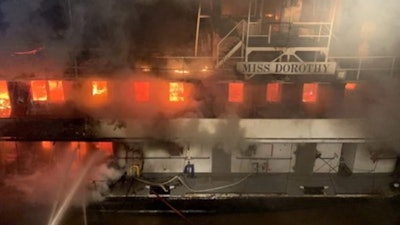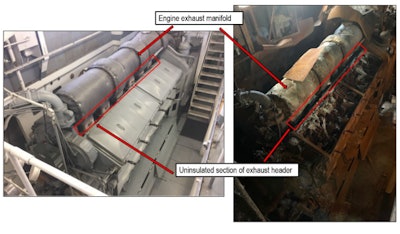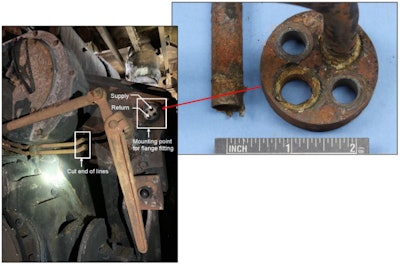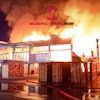
Towing vessel Miss Dorothy was pushing 14 barges on the Mississippi River north of Baton Rouge, Louisiana, on March 17, 2021, when a fire broke out in the engine room.
The eight crewmembers aboard briefly attempted to fight the fire, but were unsuccessful and evacuated. No pollution or injuries were reported. The vessel was declared a total loss at $2.4 million.
The National Transportation Safety Board on Tuesday concluded its investigation into the incident. The NTSB found that the engine room fire was caused by sprayed diesel fuel hitting an uninsulated section of the engine's exhaust system.
 Starboard main engine before (left) and after (right) the fire, with the uninsulated section of exhaust header indicated.WRBM via NTSB
Starboard main engine before (left) and after (right) the fire, with the uninsulated section of exhaust header indicated.WRBM via NTSB
Shortly after midnight on the night of the fire, alarms began to sound in the pilothouse and throughout the vessel. The pilot saw smoke that "grew in intensity very quickly" and flames coming from the starboard main engine in the engine room.
The crew attempted to use fire hoses and handheld extinguishers to fight the fire. Shortly after, the chief engineer activated the ventilation shutdown and pulled the emergency fuel oil shutoff for the fuel tank that supplied the starboard main engine.
However, air continued to be drawn in through open engine room doors and open or broken windows, and the shutoff valve remained open because the shutoff did not function as intended.
The fire continued to grow despite the crew's efforts. The captain ordered the crew to abandon ship, and the crew was rescued by a Good Samaritan vessel, which then secured the tow against the bank. The fire was extinguished several hours later by first responders and crew aboard the Good Samaritan vessel.
Regulations for towing vessels state that "piping and machinery components that exceed 220°C (428°F), including fittings, flanges, valves, exhaust manifolds, and turbochargers, must be insulated."
Investigators found that the exhaust header leading from the individual cylinder heads to the exhaust manifold in the Miss Dorothy — which were subject to temperatures greater than 428°F (often higher than 600°F) — near the suspected origin of the fire were uninsulated.
 Starboard main engine after the fire with section of fuel oil supply and return lines removed (left). Laboratory image of flange and de-brazed and separated fuel oil return line
Starboard main engine after the fire with section of fuel oil supply and return lines removed (left). Laboratory image of flange and de-brazed and separated fuel oil return line
(right).NTSB
NTSB investigators concluded it is likely that the uninsulated exhaust header acted as an ignition point for the atomized or spraying diesel fuel.
The NTSB determined the probable cause of the engine room fire was the ignition of spraying diesel fuel from a main engine's fuel system onto an uninsulated section of the engine's exhaust system.
Contributing to the severity of the fire and damage to the vessel was the inability to effectively secure ventilation to the space and fuel to the affected engine.






















